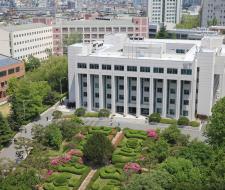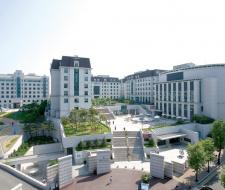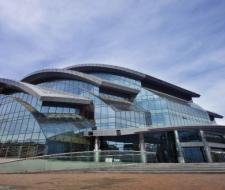Masters degree - Postgraduate in English in South Korea for international students
-
 Accreditations AACSB
Accreditations AACSB South KoreaDaejeonCurrently watching: 9from 10400.00 $ / semesterProgram namedateAgeFees
South KoreaDaejeonCurrently watching: 9from 10400.00 $ / semesterProgram namedateAgeFees -
 Program namedateAgeFees
Program namedateAgeFees -
 #34 in Public Universities in South Korea
#34 in Public Universities in South Korea South KoreaSeoulCurrently watching: 1Program namedateAgeFees
South KoreaSeoulCurrently watching: 1Program namedateAgeFees -
 Program namedateAgeFees
Program namedateAgeFees -
 from 2500.00 $ / semesterProgram namedateAgeFees
from 2500.00 $ / semesterProgram namedateAgeFees -
 #9 in Best Global Universities in South Korea
#9 in Best Global Universities in South Korea South KoreaSeoulCurrently watching: 2Program namedateAgeFees
South KoreaSeoulCurrently watching: 2Program namedateAgeFees -
 from 3477.00 $ / semesterProgram namedateAgeFees
from 3477.00 $ / semesterProgram namedateAgeFees
-
 Program namedateAgeFees
Program namedateAgeFees -
 Program namedateAgeFees
Program namedateAgeFees -

-

-

-
 Program namedateAgeFees
Program namedateAgeFees -

-

South Korea is a country with beautiful nature, extraordinary history and culture. Here, education is one of the national priorities and students from all over the world are warmly welcomed. One of the current goals of the South Korean education system is to increase the number of foreign students in the country's schools, colleges, and universities, so the conditions for studying for a master's degree in South Korea are very favorable for international students.
The choice of higher education institutions in the country is really wide, there is a wide variety of business programs with different specializations. For example, a master's degree in finance, a degree in information and media, or a degree in technology are just a few of the sought-after learning opportunities.
Alternative destinations
Why You Should Study in South Korea
South Korea is a mesmerizing blend of the ancient and modern, seamlessly weaving together nature and technology. In recent years, it has surged in popularity among international students, and for good reasons.
-
Affordable Tuition: The remarkable thing about South Korea is that it doesn't discriminate between local and international students when it comes to tuition fees. Both groups pay the same fees, which are relatively lower compared to countries like the US, Canada, or Australia. For many undergraduate and graduate programs, tuition starts at $1,000-$1,500 but can go up to $21,000 per semester. Disciplines like engineering, medicine, and humanities often have the highest fees.
-
Abundant Scholarships: Numerous South Korean universities offer scholarships to foreign students. While the requirements vary, many scholarships are often based on a student's previous academic achievements or grade point average.
-
Top-notch Education System: South Korea boasts some of the finest universities not only in Asia but globally. Their institutions frequently rank among the world's best, and South Korean students consistently place in the top three in PISA (Programme for International Student Assessment) rankings.
-
A Leader in ICT: When it comes to Information and Communication Technologies (ICT), few countries can rival the impressive strides and contributions made by major South Korean companies like Samsung, LG, and SK Hynix. South Korea is also a significant player in the automotive industry, thanks to giants like Hyundai and Kia.
-
Rich Culture and History: Living and studying in South Korea gives you the opportunity to immerse yourself in its unique culture and history. Explore awe-inspiring landmarks and attractions like the Gyeongbokgung Palace, N Seoul Tower, Bukchon Hanok Village, Lotte World Adventure and Water Park, Nami Island, Everland, Seongsan Ilchulbong, and more.
-
A Hub of Technology, Entertainment, and Media: South Korea is globally recognized for its advancements in technology, vibrant entertainment scene, and influential media presence.
Considering all these factors, South Korea undoubtedly offers a diverse and enriching experience for students from all over the world.
Master's Studies in South Korea
South Korean universities deliver top-tier education to both domestic and international students across a wide range of disciplines, including management, arts, sciences, and many more.
With approximately 376 universities offering master's degrees, the country's oldest institution is Sungkyunkwan University. Annually, around 87,000 foreign students come to study in South Korea.
A master's program in South Korea typically spans from 1 to 3 years. The academic year runs from March to February, divided into two semesters. Most universities have extended breaks from July to August and December to February.
Most master's programs in South Korea are designed to last 2 years. The course content and subjects vary depending on the university and the chosen program. Throughout their course, students are expected to earn at least 24 credit units. Upon completing their program, students conduct research and present a thesis. This thesis must be approved by three or more examiners. Only once the thesis is accepted does the student receive their degree.
Popular fields of study for international students seeking a master's degree in South Korea include:
- Auditing and Assurance
- Taxation
- Mechanical Engineering
- General Engineering
- Business
- Technology Management
- Music
Many South Korean universities offer preparatory courses for international students. These courses help bridge any knowledge gaps before pursuing a master's degree. Students can explore preparatory programs in areas like law, medicine, or any foundational courses tailored to their chosen master's program. Additionally, language courses are available to enhance English proficiency, preparing students for any required university tests.
Top South Korean Universities Offering Master's Programs in English
- Solbridge International School of Business, Woosong University
- Korea National University of Arts
- Korea National Open University
- Gachon University
- Changwon National University
How to Apply for Master's Programs in South Korea?
Previously, applying for a master's degree in South Korea was a daunting task for budding international students. Fortunately, the South Korean government initiated the creation of the "Study in Korea" website, a comprehensive guide for prospective students. The government regularly updates this platform with the latest requirements necessary for admissions into South Korean universities. It's worth noting that some universities may request additional or varying documents, so students should consult thoroughly before embarking on the admissions process.
International students can commence their application by searching for a South Korean university that offers a suitable master's program. This can be done independently online or with the assistance of an educational agent. Some university websites require the creation of a student account to initiate the application process. Inquiries can also be made via South Korean embassies in the student's home country.
Filling out and submitting the required admission documents is essential. It's crucial to note application deadlines, as they typically vary for each university and adherence to these dates is mandatory. Applications for the fall semester are usually accepted from May to June, while those for the spring semester are processed from September to November. Most South Korean universities require a payment of an application fee.
International students can request their chosen institution provide them with dormitory accommodations upon admittance to a South Korean university. It's advisable to contact the university directly, as specific application deadlines and requirements apply to such housing arrangements. If on-campus housing is unavailable, viable options include shared boarding houses, tiny rooms in goshiwons, or pricier rented apartments, depending on your budget and preferences.
Once the university sends an admission confirmation, prospective master's students can initiate their South Korean visa application process through the Hi Korea visa portal or by visiting one of their consulates in their home country. The visa type will depend on the course to be undertaken at the university; in this case, master's degree candidates will apply for a D-2 visa.
Master's Admission Criteria in South Korea
Each South Korean university has its own specific admission requirements. After selecting a university, candidates must submit their application in line with the institution's stipulations, ensuring the application form is correctly completed. This form should typically include a letter of recommendation, a statement of purpose, a copy of the parent's passport alongside the candidate's passport copy, a medical certificate, academic transcripts, and proof of proficiency in either Korean or English, depending on the program's language requirements.
Students applying for a master's degree in South Korea are usually required to provide an English proficiency test score as evidence of their language capability. South Korean universities commonly accept the following English qualifications:
- TOEFL
- IELTS
- PTE Academic
- C1 Advanced or C2 (Cambridge English Qualifications)
Cost of Master's Education in South Korea
One of the advantages of studying in South Korea is that tuition fees are consistent for both domestic and international students. This policy is part of the government's strategy to attract more foreign students. Individuals from all over the world come to earn their bachelor's and master's degrees in South Korea, drawn by the high quality of education and, for many, the relatively affordable cost of living and studying in the country.
The cost of education varies depending on the subject and the university. For instance, tuition fees for an undergraduate course at a public university are approximately $4,350 per semester, whereas tuition at a private institution in South Korea averages around $5,800 per semester.
South Korean universities are keen to attract top-tier international students and may offer full or partial tuition waivers. The cost of a master's program in South Korea will differ based on the selected university, course, and its duration. Prices typically range from $1,500 to $21,000.
Average monthly expenses in South Korea are estimated to be between $900 and $1,400:
- University dormitory accommodation: $600-$1,400 per semester
- Private rental: $300-$400 per month, plus a security deposit ($3,000-$5,000)
- Food: $300-$500 per month
- Medical insurance: $20 per month
- Monthly transportation pass (trains, subway, buses): $40
The overall cost of education and living in South Korea can vary widely depending on the city, chosen university, and the student's individual preferences and lifestyle.
Learning programs-summary information
| Name | Meaning | Equivalent | Min. age | Duration, years |
Next stage | Cost |
|---|---|---|---|---|---|---|
| GCSE | General certificate of secondary education | secondary education (non-accomplished) | 14 | 1–2 | A-Levels | 15,000 USD+ |
| A-Levels | Advanced level | secondary education (accomplished) | 16 | 2 | University | 15,000 USD+ |
| BTEC | Business and Technology Education Board | secondary special education | 14 | 2–3 | University/ work | 15,000 USD+ |
| Oxbridge Preparation | Preparing for Oxford and Cambridge | secondary education (accomplished) | 17 | 1 | University | 15,000 USD+ |
| International Baccalaureate | International baccalaureate | secondary education (accomplished) | 16 | 2 | University | 18,000 USD+ |
| Foundation/ Pathway Year | Preparatory year | admission to the 1st year of university | 17 | 1 | University | 14,000 USD+ |
| NCUK | The Northern consortium | 2 year university | 17,5 | 1 | 2 year University of NCUK | 13,000 USD+ |
| Special Preparation (Medics/Math/Business) | Specialized training | - | 14 | optional | optional | 4,000 USD+ |
| Academic English | Academic English | Language school | 8 + | 6–12 months | School or University | 8,000 USD+ |
Top 14 best universities in Switzerland 2026
| 1 | Glion Institute of Higher Education Switzerland |
| 2 | Les Roches International School Montana |
| 3 | César Ritz Colleges Switzerland |
| 4 | IHTTI School of Hotel Management |
| 5 | Ecole Hoteliere de Lausanne |
| 6 | Geneva Business School |
| 7 | HIM Hotel Institute Montreux |
| 8 | Swiss Hotel Management School |
| 9 | Webster University Geneva |
| 10 | Business and Hotel Management School |
| 11 | Luzern IMI |
| 12 | Swiss Hotel Management School (SHMS) Caux |
| 13 | International University in Geneva |
| 14 | Culinary Arts Academy Switzerland |
